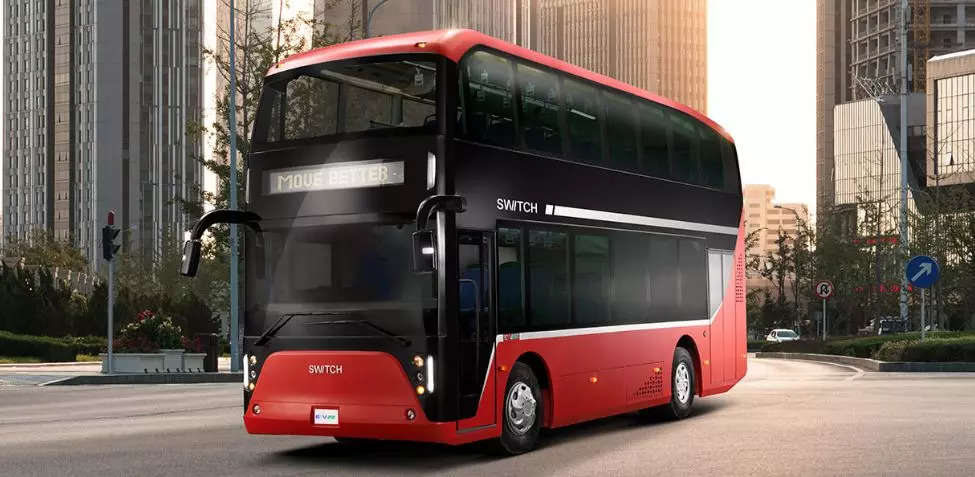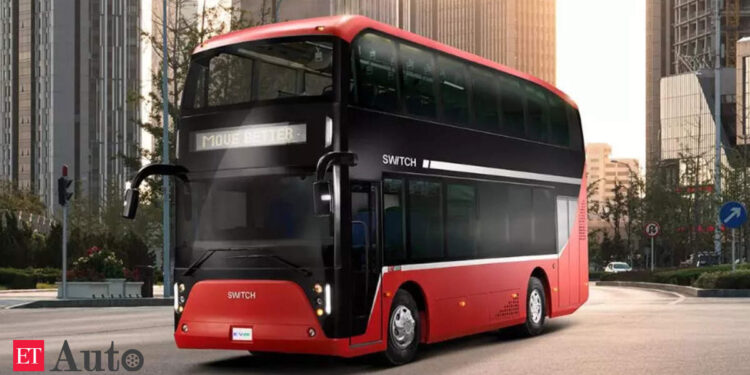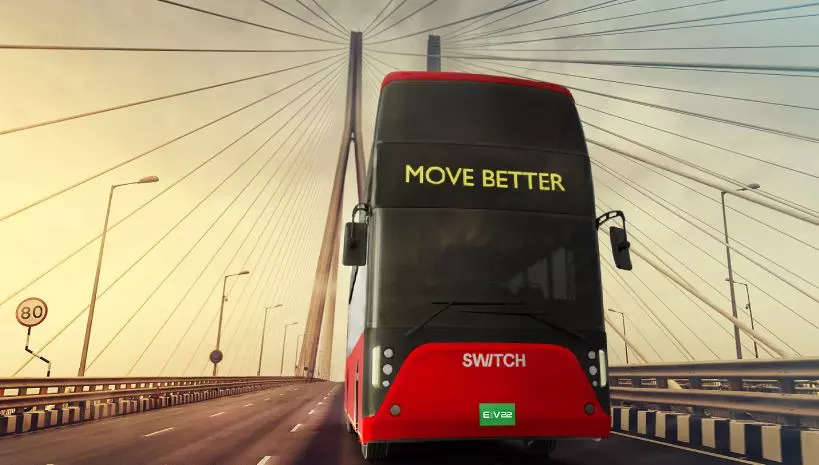
Mumbai: Double decker bus, an icon of India’s financial capital Mumbai, is set to make a comeback in an electric avatar before the last of the diesel double decker buses get off the road here next year. The supplier of at least the first set of the e-double-deckers will be Switch Mobility, a company of the same Hinduja Group that supplied the diesel ones. It was Ashok Leyland, the flagship of the Hinduja Group, which supplied the diesel double-deckers to Maharashtra’s BEST for years.
Unveiled today, the Switch EiV 22 double decker has secured an order for 200 units from the Maharashtra state government undertaking Brihanmumbai Electric Supply and Transport (BEST). The bus is 9 metre long and can seat 66 passengers. Depending on the battery and vehicle specifications, each EiV22 will cost between INR 1.8 crore and INR 2.3 crore.
“With over 100 Switch electric double deckers in service on the UK roads, we are happy not only to bring back this icon to life, but also to reinforce our commitment to create this form factor for India and the globe,” Dheeraj Hinduja, chairman, Switch Mobility, said. An estimated INR 25 crore –INR 30 crore was invested in developing EiV22 which shares a significant amount of components and systems with other variants of Switch buses.
According to Nitin Gadkari, Minister of Road Transport and Highways in India, there is a need to transform the country’s transport system for a long term perspective. “With focus on reforming urban transport, we are trying to build a low footprint and high passenger density integrated EV mobility ecosystem,” the union minister said at the launch of the electric bus.
EiV22 is based on a 650V platform which is the same as the Switch EiV12 and E1. Its kerb weight is 18% more than a similar size single decker bus but seats nearly double the number of passengers. Unfavourable level of ease and cost of maintenance were the factors which led BEST to phase out the diesel double-deckers. The BEST electric double deckers may not face that challenge as they will be provided as a service through Switch’s sister company Ohm Global Mobility.
The buses, claimed to be the ‘world’s first semi-low floor, air conditioned, electric double decker with wider door on rear overhang and a rear staircase’, are expected to start ferrying passengers in Mumbai from early next year. The OEM plans to have more Indian cities as buyers of these buses.
Mahesh Babu, CEO, Switch Mobility India, and COO, Switch Mobility, is betting on the growing need for more space-efficient mobility solutions, and the advantages of tailpipe emission-free technology for electric double-deckers to grow in India.
”We are at a very early stage of adoption. Mumbai is going to be a test bed, as it has been for new things, including the double decker. I strongly believe that in future double-deckers will play a very vital role in major cities where the population is very high,” Babu told ETAuto.
Switch Mobility is in talks with “multiple cities”, other state capitals, and metropolitan cities in the country, to supply EiV22. “Right now we have configured the bus to meet the BEST requirements. We believe it will be fit for most of the cities. But if there is any unique requirement, the EiV architecture is modular and scalable,” he said.
“We did not explore it (double decker) fully when it was in the diesel form, and a lot of things were happening in the country,” Babu said.
EiV22 is powered by a 231 kWh capacity, 2-string, liquid cooled, NMC chemistry battery pack with dual gun charging system. Even though Ashok Leyland had earlier betted on the battery swapping model, the Switch buses offer only fixed on-board charging as Babu says “the current commercials (of battery swapping) is not giving a viability to scale it up in a commercial way”. The bus has a claimed driving range of up to 250 km in intra-city applications.
Switch Mobility looks to leverage the combined experience of its parent Ashok Leyland and of the British busmaker Optare (acquired by Ashok Leyland in 2011) in developing double-deckers to tap new opportunities with the same form factor but with a new propulsion technology. Switch Mobility was created in 2020 by combining the electric vehicle (EV) units of Ashok Leyland and Optare.
Production ramp-up
The bus segment, along with two and three-wheelers, is propelling the prospects of the Indian EV industry. Betting on the growing EV trend, and the potential of double deckers, Switch Mobility looks to double its bus manufacturing capacity to 5,000 units soon. It currently shares Ashok Leyland’s production facility in Ennore, Tamil Nadu.
The next 3 years are seen as the ramp-up phase for the company. During this period Switch Mobility plans to enter other commercial vehicle segments, key among them being the electric light truck market. Switch Mobility is looking at setting up a new manufacturing plant by 2025. The ramp-up activities will be funded by the earlier announced GBP 300 million (over INR 2800 crore) investment by 2025.















